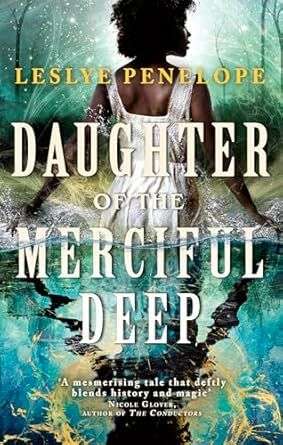
For all things fantasy, horror, and speculative fiction

Review Details
Review type: Book
Title: Daughters of the Merciful Deep
Author: Lesley Penelope
Publisher: Orbit

Reviewed by: Rym Kechacha
Daughters of the Merciful Deep by Lesley Penelope
Book Review
Rym Kechacha
Jane Edwards is a competent young woman who lives in the all-Black town of Awenasa sometime in the thirties. Awenasa is a refuge from racism, persecution and a world of insecurity and prejudice and many of the townsfolk – Jane included – have arrived there after traumatic events elsewhere. Now, the haven is at risk of flooding to create a dam, and when offered an unbelievable chance to save her town, Jane must confront her own past, the never-ending racism of the world outside Awenasa, and connect with the spirituality and magic of her ancestors.
The novel is based on several historical examples of Black towns that flooded for dam creation, and the author points us towards this history in a note at the end of the novel. I always think it’s a beautiful use of the fantastical as a mode of storytelling to bring history to life with a ‘what if’?
The book is filled with water and its magical properties; the Noxahatchie river that runs through the town of Awenasa; Jane’s fear of the water based on a childhood incident; the other towns sunken under other dams; and the spectres of the bodies sunk in the Atlantic after the horrors of the so-called middle passage.
The magic is based on a really interesting set of gods who act like humans, with opinions, feuds, and mistakes. Mama Yoja (an earth goddess), Papa Loku (a god of the underworld) and Shuna (a goddess of fresh water) are based on deities from the African continent, referencing religious beliefs such as Voudou and Santeria, syncretic faiths for the experience of a diaspora seeking to reconcile the pain of separation from a traditional culture with the necessity of moving forward in a new and constantly changing world. This is mirrored on a character level as Jane has to face her own past and the guilt that dogs her every day in order to save her town and everyone she loves.
Some of the plot points of how the magic was used were a bit hand-wavy for me; I wanted a bit more detail on how and a bit more indication of the cost of using magic. At the beginning of an alternate history story like this, a reader never knows if the world you’re entering is already known to be a magical one or if the revelation of magic will turn out to be a surprise to the characters.
That was not much clearer to me by the end, and I was left feeling a little short-changed by the lack of exploration of the magic, how it interacted with the characters’ Christianity and their own sense of their lost, half-remembered or longed-for ancestral traditions.
I always feel that some authors are interested in incorporating elements of magic and fantasy in their work because of the beauty and fun of it; in those stories, dragons are just dragons, and everyone’s having fun despite or because of it. I feel that Leslye Penelope is using the fantastical elements of this book firmly as a metaphor for the Black experience of loss to explore ideas of community building and question what a utopia actually might be.
You’re struck by the lack of interest the characters have in staying in the real world. I wonder if that was a deliberate choice on the author’s part to make it clear that for so many Black people who had endured so much ancestral and individual trauma, there really would be nothing about this world that they might miss, nothing that they felt the world as it was could give them.
That said, this is a book that is optimistic – though realistic – about the power of community. Jane’s determination to save everyone in her town, even those she doesn’t like very much, is a beautiful riposte to fantasy writing that focuses on special individuals – chosen ones – and ignores the context in which they are made and broken.
Tags: Ancestral MagicFantasyGodsLeslye Penelope
Category: Book Review
All reviews
Latest Reviews:
- Januaries by Olivie Blake
- Basic Roleplaying: Creatures
- Five Mini-Adventures – PDF (Shadowdark RPG)
- Cursed Scroll Zine, Vol. 1: Diablerie! RPG Zine
- Empire of the Dawn by Jay Kristoff
- The God and the Gumiho by Sophie Kim
- Citadel of the Moon by Mike Chinn
- Hemlock and Silver by T. Kingfisher
- Thirsty by Lucy Lehane
- Solodark RPG
Review tags:
Action (49) Adventure (70) Contemporary Fantasy (18) Fantasy (120) Gothic Horror (12) Harper Voyager (12) Historical Fantasy (14) Hodderscape (12) Horror (76) Orbit Books (33) Romance (28) Romantasy (13) Science Fiction (35) Titan Books (36) TorDotCom (12)
Leave a Reply